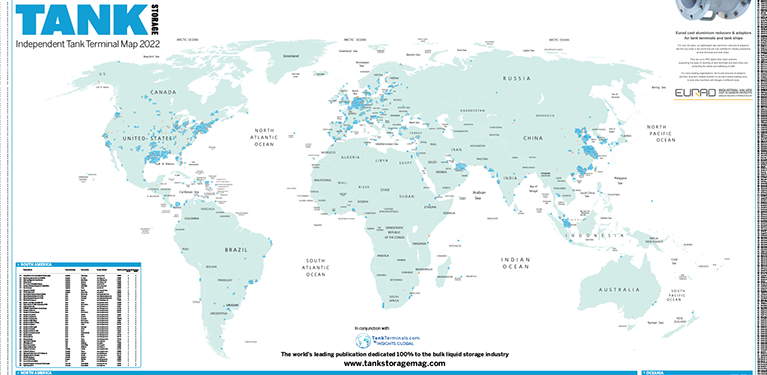Daniel Strydom and Henrik Olsson from Stolthaven New Orleans discuss trends in the storage of renewable diesel and sustainable aviation fuel
 As companies pivot to greener operations, there is an ever-increasing demand for feedstocks. An increasing number of refineries in Louisiana are moving into the production of renewable diesel – typically requiring products like tallows, fats and used cooking oil (UCO).
As companies pivot to greener operations, there is an ever-increasing demand for feedstocks. An increasing number of refineries in Louisiana are moving into the production of renewable diesel – typically requiring products like tallows, fats and used cooking oil (UCO).
They need storage and logistical support, which Stolthaven New Orleans is able to provide. Its assets are a perfect match for storing feedstocks, which often require special treatment. The facility is the closest public terminal to the mouth of the Mississippi River, with excellent shipping, rail and road connections, so Stolthaven New Orleans can handle the onward transportation of these products to support efficient distribution locally and across the US.
Renewable diesel logistics
A lot of feedstocks can be acidic and have a high viscosity, which means they must be stored in stainless steel or in carbon steel coated tanks with a liner. ‘These products also have specific heating requirements,’ comments Henrik Olsson, commercial and business development manager, Stolthaven Terminals, North America. Stolthaven New Orleans has a lot of experience storing and handling feedstocks and it has optimally sized tanks with the required heating capabilities, insulation and lining.
Modifying a standard carbon steel tank to meet these requirements can be very expensive; and would normally be passed on to the customer. ‘Stolthaven New Orleans already has the required assets –with the capability to maintain and insulate the products at the correct temperatures – so that’s a big advantage,’ says Daniel Strydom, general manager, Stolthaven Terminals North America.
Stolthaven New Orleans also has many smaller-size tanks in the 2,000-5,000 m³ range. This is important because feedstocks for renewables come in parcel sizes of 1,000-2,000 metric tons – which are much smaller than for most other products – and they need to be kept in separate streams (tallows, fats, UCO, etc). The facility’s assets are ready-made to meet these specific requirements; and Stolthaven New Orleans is witnessing an increase in demand for them.
The facility also handles the finished bio-products, which can be stored in its larger, general-purpose tanks and moved in larger parcels and don’t require special treatment. ‘We’re delighted to
be able to support customers in this burgeoning product category and support the transition to greener energy and fuel alternatives,’ says Olsson. ‘It aligns with our own sustainability ambitions to reduce our environmental footprint, reduce waste and energy usage and minimize environmental harm.’
While there are tremendous growth opportunities which Stolthaven New Orleans is keen to explore, the company remains committed to meeting the needs of its ‘traditional’ customers in the bulk liquid petrochemical industry. As such, Stolthaven New Orleans continues to invest in state-of-the-art storage and handling services for these products. The company also has a site in Houston, one of the largest terminals in its network, with a current capacity of more than 570,000 m3. 
The future of renewable diesel
Over the next 10 years or so, there will be an increase in demand for bulk liquid storage in the US Gulf, supported by increased imports and exports, that will be driven by both the petrochemical sector and the rapidly growing renewable fuels market. In response to – or preparation for – that, Stolthaven New Orleans is looking to expand in the US Gulf, so it can continue to meet its customers’ growing needs for specialist storage and handling services.
The planned expansion involves increasingly automated operations, additional specialist services for customers and the installation of new tanks, which will significantly increase Stolthaven Terminals’ current total US storage capacity of 954,491 m³.
Stolthaven New Orleans also sees the potential for local aggregation services for feedstocks. The traditional sources for importing feedstocks for renewable diesel have been in Asia and they have always been aggregated at source.
Now, as the demand increases and there’s a more limited supply from Asia, Stolthaven New Orleans sees that players in this field in the US are looking for alternative sources. These new sources are likely to be quite disparate so there often won’t be enough to aggregate at source; it will be a case of importing in ISO tanks and aggregating in the US.
‘This would require quite complex logistics and sophisticated infrastructure and Stolthaven Terminals can play a critical role here, with its existing infrastructure and further supported by its planned expansion of assets and services in the US,’ comments Strydom.














